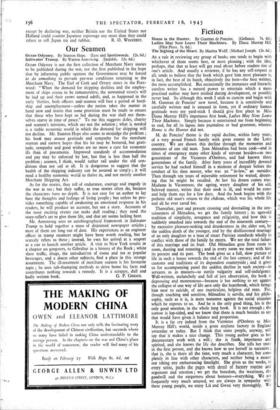Our Seamen
Ocean Odyssey is not the first collection of Merchant Navy stories to be published during the war, nor the first published in the hope that by informing public opinion the Government may be forced to do something to prevent pre-war conditions returning to the Merchant Navy. The Earl of Cork and Orrery states in the Fore- word : " When the demand for shipping declines and the employ- ment of ships ceases to be remunerative, the unwanted vessels will be laid up and their crews turned adrift, and, as happened in the early 'thirties, both officers and•seamen will face a period of hard- ship and unemployment—unless the nation takes the matter in hand now and insists that some provision must be made to ensure that those who have kept us fed during the war shall not them- selves starve in time of peace." To me this suggests doles, charity and seamen's missions, which are not the solution ; what is needed is a stable economic world in which the demand for shipping will not decline. Mr. Stanton Hope also seems to misjudge the problem ; his book may arouse gratitude and sympathy for the merchant seaman and earnest hopes that his lot may be bettered, but grati- tude, sympathy and good wishes are no more a cure for economic ills than of pneumonia. Improved standards of accommodation and pay may be enforced by law, but that is less than half the problem ; seamen, I think, would rather sail under the old con- ditions than not sail at all. It is dangerous to suggest that the health of the shipping industry can be assured so simply ; it will need a healthy economic world to thrive in, and not merely another Merchant Shipping Act.
As for the stories, they tell of endurance, courage and tragedy in the war at sea ; but they suffer, as true stories often do, because the characters have no depth. It is not easy for an author to lay bare the thoughts and feelings of living people ; but unless he pro- vides something capable of awakening an emotional response in his readers, he will produce an account, but not a story. Accounts of the most exciting events can make dull reading ; they need the story-teller's art to give them life, and that art seems lacking here.
Mr. Armstrong uses an autobiographical framework in Saltwater Tramp to hold together a mass of disjointed newspaper articles ; most of them are long out of date. His experiences as an engineer officer in tramp steamers might have been worth reading, but he scarcely refers to these ; instead, he uses his arrival at a seaport as a cue to launch another article. A visit to New York results in a chapter on gangsters, to Gibraltar in a history of the Rock ; white slave traffic, drugs, the introduction of cocoa and tea as popular beverages, and a dozen other subjects, find a place in this strange assortment. The ill-treatment of merchant seamen is his favourite topic ; he uses tub-thumping methods to drive home his facts and contributes nothing towards a remedy. It is a scrappy, dull and


























 Previous page
Previous page